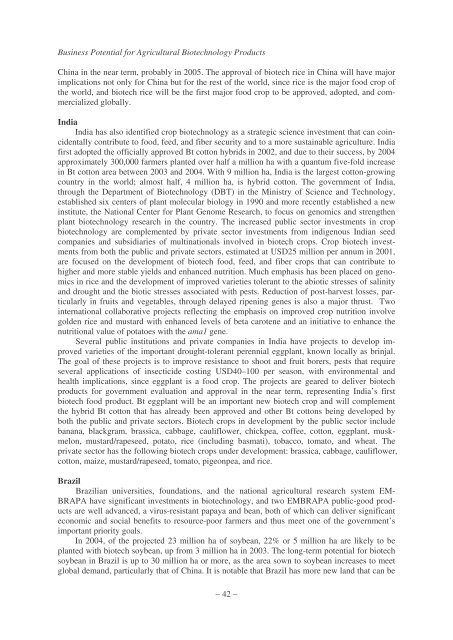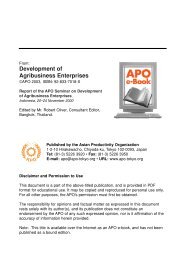Business Potential for Agricultural Biotechnology - Asian Productivity ...
Business Potential for Agricultural Biotechnology - Asian Productivity ...
Business Potential for Agricultural Biotechnology - Asian Productivity ...
You also want an ePaper? Increase the reach of your titles
YUMPU automatically turns print PDFs into web optimized ePapers that Google loves.
<strong>Business</strong> <strong>Potential</strong> <strong>for</strong> <strong>Agricultural</strong> <strong>Biotechnology</strong> Products<br />
China in the near term, probably in 2005. The approval of biotech rice in China will have major<br />
implications not only <strong>for</strong> China but <strong>for</strong> the rest of the world, since rice is the major food crop of<br />
the world, and biotech rice will be the first major food crop to be approved, adopted, and commercialized<br />
globally.<br />
India<br />
India has also identified crop biotechnology as a strategic science investment that can coincidentally<br />
contribute to food, feed, and fiber security and to a more sustainable agriculture. India<br />
first adopted the officially approved Bt cotton hybrids in 2002, and due to their success, by 2004<br />
approximately 300,000 farmers planted over half a million ha with a quantum five-fold increase<br />
in Bt cotton area between 2003 and 2004. With 9 million ha, India is the largest cotton-growing<br />
country in the world; almost half, 4 million ha, is hybrid cotton. The government of India,<br />
through the Department of <strong>Biotechnology</strong> (DBT) in the Ministry of Science and Technology,<br />
established six centers of plant molecular biology in 1990 and more recently established a new<br />
institute, the National Center <strong>for</strong> Plant Genome Research, to focus on genomics and strengthen<br />
plant biotechnology research in the country. The increased public sector investments in crop<br />
biotechnology are complemented by private sector investments from indigenous Indian seed<br />
companies and subsidiaries of multinationals involved in biotech crops. Crop biotech investments<br />
from both the public and private sectors, estimated at USD25 million per annum in 2001,<br />
are focused on the development of biotech food, feed, and fiber crops that can contribute to<br />
higher and more stable yields and enhanced nutrition. Much emphasis has been placed on genomics<br />
in rice and the development of improved varieties tolerant to the abiotic stresses of salinity<br />
and drought and the biotic stresses associated with pests. Reduction of post-harvest losses, particularly<br />
in fruits and vegetables, through delayed ripening genes is also a major thrust. Two<br />
international collaborative projects reflecting the emphasis on improved crop nutrition involve<br />
golden rice and mustard with enhanced levels of beta carotene and an initiative to enhance the<br />
nutritional value of potatoes with the ama1 gene.<br />
Several public institutions and private companies in India have projects to develop improved<br />
varieties of the important drought-tolerant perennial eggplant, known locally as brinjal.<br />
The goal of these projects is to improve resistance to shoot and fruit borers, pests that require<br />
several applications of insecticide costing USD40–100 per season, with environmental and<br />
health implications, since eggplant is a food crop. The projects are geared to deliver biotech<br />
products <strong>for</strong> government evaluation and approval in the near term, representing India’s first<br />
biotech food product. Bt eggplant will be an important new biotech crop and will complement<br />
the hybrid Bt cotton that has already been approved and other Bt cottons being developed by<br />
both the public and private sectors. Biotech crops in development by the public sector include<br />
banana, blackgram, brassica, cabbage, cauliflower, chickpea, coffee, cotton, eggplant, muskmelon,<br />
mustard/rapeseed, potato, rice (including basmati), tobacco, tomato, and wheat. The<br />
private sector has the following biotech crops under development: brassica, cabbage, cauliflower,<br />
cotton, maize, mustard/rapeseed, tomato, pigeonpea, and rice.<br />
Brazil<br />
Brazilian universities, foundations, and the national agricultural research system EM-<br />
BRAPA have significant investments in biotechnology, and two EMBRAPA public-good products<br />
are well advanced, a virus-resistant papaya and bean, both of which can deliver significant<br />
economic and social benefits to resource-poor farmers and thus meet one of the government’s<br />
important priority goals.<br />
In 2004, of the projected 23 million ha of soybean, 22% or 5 million ha are likely to be<br />
planted with biotech soybean, up from 3 million ha in 2003. The long-term potential <strong>for</strong> biotech<br />
soybean in Brazil is up to 30 million ha or more, as the area sown to soybean increases to meet<br />
global demand, particularly that of China. It is notable that Brazil has more new land that can be<br />
– 42 –
















